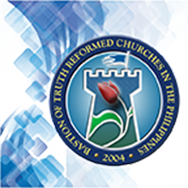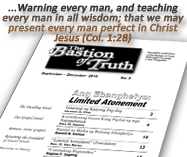

(Excerpt) Brian Schwertley
Most people who argue for the use of musical instruments in public worship today do not use the passages from the Chronicles for justification of their practice, but instead quote the references to musical instruments from the book of Psalms.83 The problem with this approach is that the Psalms often speak of the worship of Jehovah using ceremonial types. The Psalms speak of offering sacrifice (Ps. 20:3; 54:6; 107:22; 118:27), burnt offerings (Ps. 20:3; 50:8; 51:19; 66:13, 15), the altar (Ps. 26:6; 43:4; 51:19; 118:27), God’s house—the temple (Ps. 101:2; 122:1). The Psalms speak of walking within God’s house (Ps. 101:2), of going into the house of Jehovah (Ps. 122:1), of worshiping toward God’s holy temple (Ps. 5:7; 138:8), and of inquiring in God’s temple (Ps. 27:4). Orthodox Christians do not use the passages in the psalms that speak of sacrifices and burnt offerings as proof texts for offering sacrifices in church because they know from other portions of Scripture that these duties belonged to the Levitical priesthood and were part of the ceremonial temple system that has been fulfilled and superseded by Christ. Likewise, the clear historical passages of Scripture that discuss the use of musical instruments in public worship teach that their use was ceremonial.84 Therefore, the Psalm passages that speak of music in public worship do not justify their use today. For if they did, the passages that speak of burnt offerings could be used to introduce animal sacrifices into today’s worship. Their “argument from the Psalms proves too much and is therefore worthless.”85 Girardeau writes: “If, now, the argument holds good, which is derived from the Psalms in support of the use of instruments in the public worship of the Christian church, it equally holds in justification of the offering of bloody sacrifices in that worship. The absurdity of the consequence completely refutes the argument.”86 Their only hope would be to prove from the synagogue worship that instruments also had a non-ceremonial worship function or to find warrant for musical instruments in public worship in the New Testament. The synagogue worship (as noted above) did not involve any musical instruments at all. The New Testament does not authorize the use of musical instruments in Christian public worship.87 G. I. Williamson writes: “The fundamentalists speak of rebuilding the temple in Jerusalem, and thus take seriously the fact that this Old Testament worship was commanded by God. If we are going to revive ceremonial worship, in other words, then let us at least be careful to restore it exactly as it was commanded. Let us not pick and choose as we will. That the fundamentalist is mistaken, however, in expecting a restoration of that which is passed away is perfectly plain.”88
The section of Scripture most often alluded to as a justification for the use of instruments in new covenant public worship is Psalm 150: “Praise Him with the sound of the trumpet; praise Him with the lute and harp! Praise Him with the timbrel and dance; praise Him with stringed instrument and flutes! Praise Him with loud cymbals; praise Him with high sounding cymbals!” (vv. 2-5). People who appeal to Psalm 150 as a justification for the use of musical instruments in new covenant worship violate a number of standard interpretive procedures. First, what did this Psalm mean to the original old covenant Jewish audience? Did the Jews use this Psalm and other such Psalms as a justification for the introduction of musical instruments in their synagogue worship? No. They most certainly did not. Jewish synagogues did not use musical instruments in praise until 1810.
Second, this scripture can only be used as a justification for new covenant worship if it is isolated from the rest of the Bible. Scripture must be used to interpret Scripture. The broad context of Scripture teaches that: dancing and taboret playing were performed outdoors during festive occasions by women (Ex. 15:20; Jud. 11:34; 21:21; 1 Sam. 18:6; 221:11; 29:5; Jer. 31:4); only priests were authorized to play trumpets in worship (Nu. 10:8,10; 2 Chron.5:11-14; 29:26: Ezra 3:10; and , harps, lyres and cymbals were only authorized to be played by Levites (1 Chron. 15:14-24, 23:5, 28:11-13, 19; 2 Chron. 5:11-14; 20:27-28; 29 ;25-27; Neh. 12:27, etc.).89 To completely ignore the Old Testament teaching regarding the use of instruments in worship when referring to Psalm 150 as a proof text for new covenant praise is sloppy exegesis and an illegitimate method of using a proof text.
Third, people who use this passage as authorization for musical instruments also ignore the immediate context. Is this passage meant to be taken literally? Or is it a poetic way of speaking of God’s people offering dedicated, fervent praise throughout the earth? If one takes this passage literally, then not only does it blatantly contradict the rest of the Old Testament’s teaching regarding musical instruments in worship, but it also teaches that every believer should play musical instruments during worship (an absurd notion). Furthermore, it would teach that the heathen and brute creatures also are to praise Jehovah. Regarding Psalm 150:3, Calvin writes: “I do not insist upon the words in Hebrew signifying the musical instrument [in other words they may just be poetic metaphors exhorting believers to great praise]; only let the reader remember that sundry different kinds are here mentioned, which were in use under the legal economy, the more forcibly to teach the children of God that they cannot apply themselves too diligently to the praises of God.”90
Given the fact that Psalm 150 incorporates the instrumentation of the temple, the taboret playing and dancing of victory celebrations as well as instruments only used upon secular occasions (e.g., v. 4: “stringed instruments” [minnim] and “flutes” [‘ugabh]); coupled with the exhortation for everything that breathes to praise Jehovah it should be rather obvious that this Psalm was not meant to be used as a literal instruction guide for public worship. Psalm 150 is an exhortation expressed in poetic language which teaches that everyone in heaven and on earth should praise Jehovah with every fiber of his being. (Furthermore, as noted above, the Jews of the old dispensation did not regard Psalm 150 as authorizing the use of instruments in public worship outside of the Temple.)
Those who seek authorization for musical instruments in Psalm 150 should also take note of the word sanctuary in verse one: “Praise God in His sanctuary.” If one is going to use Psalm 150 as proof for the use of musical instruments in new covenant public worship, then one has an obligation to use all the specific instruments commanded and one must also use liturgical dance. Presbyterian pastors who appeal to this Psalm as authorization cannot (according to their own use of it) forbid taboret (tambourine) playing and dancing in the aisles during their worship services.
A biblical view of Psalm 150 is more readily found in the older Presbyterian and Reformed commentators. The Covenanter David Dickson writes of verse 3 through 5: “Here are other six exhortations, teaching the manner of praising God under the shadow of typical music, appointed in the ceremonial law. Whence learn. 1. Albeit the typical ceremonies of musical instruments in God’s public worship, belonging to the pedagogy of the church, in her minority before Christ, be now abolished with the rest of the ceremonies; yet the moral duties shadowed forth by them, are still to be studied, because this duty of praising God, and praising him with all our mind, strength, and soul, is moral, whereunto we are perpetually obliged.”91
Matthew Henry writes: “In what manner this tribute must be paid, with all the kinds of musical instruments that were then used in the temple-service, v. 3-5…. Our concern is to know…that, various instruments being used in praising God, it should be done with exact and perfect harmony; they must not hinder, but help one another. The New Testament concern, instead of this, is with one mind and one mouth to glorify God, Rom xv.6…. He began with a call to those who had a place in his sanctuary and were employed in the temple-service; but he concludes with a call to all the children of men, in prospect of the time when the Gentiles should be taken into the church, and in every place, as acceptably as at Jerusalem, this incense should be offered, Mal. i.2.”92
The Reformed Baptist scholar John Gill writes: “Praise him with the psaltery; to which songs were sung. And harp: which were instruments, both were used in divine worship under the former dispensation; and in which David was well skilled and delighted and appointed proper persons to praise with them, 1 Chron. xv. 20,21. They were typical of the spiritual melody made in the hearts of God’s people, while they were praising him in psalms, hymns, and spiritual songs, under the Gospel, Ephes. v.19.”93

A newsletter/journal published in Filipino (Tagalog dialect) as a ministry of the denomination of Bastion of Truth Reformed Churches in the Philippines. It is primarily a means of instruction as well as a medium to proclaim and explain the convictions of the BTRC concerning the Gospel of God's sovereign particular grace in salvation.